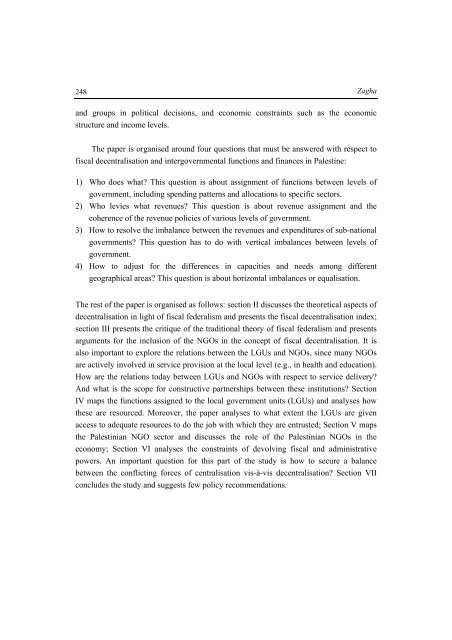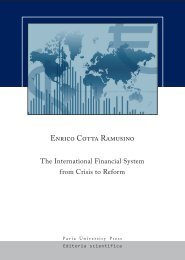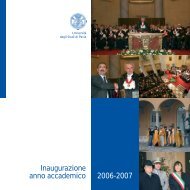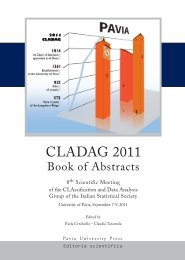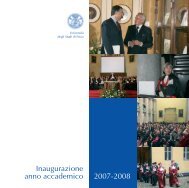The Palestinian Economy. Theoretical and Practical Challenges
The Palestinian Economy. Theoretical and Practical Challenges
The Palestinian Economy. Theoretical and Practical Challenges
Create successful ePaper yourself
Turn your PDF publications into a flip-book with our unique Google optimized e-Paper software.
248<br />
Zagha<br />
<strong>and</strong> groups in political decisions, <strong>and</strong> economic constraints such as the economic<br />
structure <strong>and</strong> income levels.<br />
<strong>The</strong> paper is organised around four questions that must be answered with respect to<br />
fiscal decentralisation <strong>and</strong> intergovernmental functions <strong>and</strong> finances in Palestine:<br />
1) Who does what? This question is about assignment of functions between levels of<br />
government, including spending patterns <strong>and</strong> allocations to specific sectors.<br />
2) Who levies what revenues? This question is about revenue assignment <strong>and</strong> the<br />
coherence of the revenue policies of various levels of government.<br />
3) How to resolve the imbalance between the revenues <strong>and</strong> expenditures of sub-national<br />
governments? This question has to do with vertical imbalances between levels of<br />
government.<br />
4) How to adjust for the differences in capacities <strong>and</strong> needs among different<br />
geographical areas? This question is about horizontal imbalances or equalisation.<br />
<strong>The</strong> rest of the paper is organised as follows: section II discusses the theoretical aspects of<br />
decentralisation in light of fiscal federalism <strong>and</strong> presents the fiscal decentralisation index;<br />
section III presents the critique of the traditional theory of fiscal federalism <strong>and</strong> presents<br />
arguments for the inclusion of the NGOs in the concept of fiscal decentralisation. It is<br />
also important to explore the relations between the LGUs <strong>and</strong> NGOs, since many NGOs<br />
are actively involved in service provision at the local level (e.g., in health <strong>and</strong> education).<br />
How are the relations today between LGUs <strong>and</strong> NGOs with respect to service delivery?<br />
And what is the scope for constructive partnerships between these institutions? Section<br />
IV maps the functions assigned to the local government units (LGUs) <strong>and</strong> analyses how<br />
these are resourced. Moreover, the paper analyses to what extent the LGUs are given<br />
access to adequate resources to do the job with which they are entrusted; Section V maps<br />
the <strong>Palestinian</strong> NGO sector <strong>and</strong> discusses the role of the <strong>Palestinian</strong> NGOs in the<br />
economy; Section VI analyses the constraints of devolving fiscal <strong>and</strong> administrative<br />
powers. An important question for this part of the study is how to secure a balance<br />
between the conflicting forces of centralisation vis-à-vis decentralisation? Section VII<br />
concludes the study <strong>and</strong> suggests few policy recommendations.


